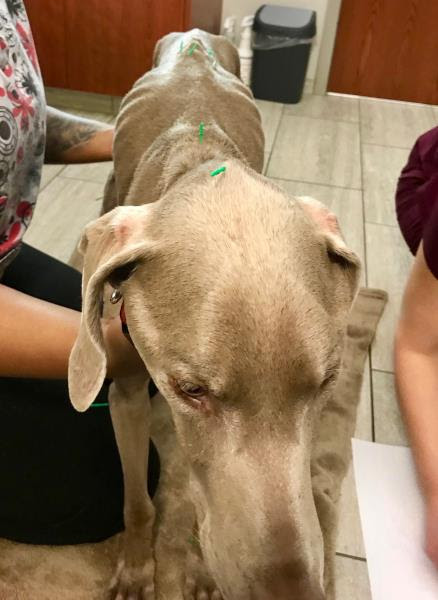Lyme Disease Awareness Month
May is Lyme Disease Awareness Month. What is Lyme disease? Is my dog at risk? Am I doing everything I can be doing to prevent this disease? We hope this article will answer your questions about Lyme disease in dogs.
What Is It?
Lyme disease is caused by a small, intracellular spirochete bacteria (Borrelia burgdorferi) which is transmitted by the deer tick (Ixodes scapularis in the East & Midwest and Ixodes pacificus in the West). In humans, 80% of those infected with Lyme disease will develop a rash (erythema migrans or “bulls-eye” lesion) and flu-like symptoms within days to weeks of the tick bite. These signs can progress to joint pain, neurologic abnormalities, and heart rhythm disturbances. Approximately 60% of untreated people will develop chronic disease consisting mainly of intermittent arthritis.
Unlike humans, signs in dogs do not occur for weeks to months after infection. The hallmark clinical sign in dogs is arthritis and usually presents as pain in one or more joints. Affected dogs may also have a fever, swollen lymph nodes, and anorexia. If left untreated, the disease can progress and cause chronic changes in the body, primarily in the joints and kidneys. The most serious complication in infected dogs is a kidney disease called glomerulonephritis. This is an immune-mediated disease of the kidney caused by chronic antigenic stimulation. Dogs with this disease lose important proteins in the urine, leading to low blood proteins, and in many cases, kidney failure. Other less common chronic diseases associated with Lyme disease include meningitis, and in very rare cases, heart or neurologic abnormalities.
Diagnosis
Unfortunately, the diagnosis of Lyme disease is fairly complicated. Several tests are available that detect antibodies to the B. burgdorferi organism. However, a positive antibody titer only indicates that your pet has been exposed to the organism at some point in time. Just because your pet has been exposed to the organism does not mean that your pet necessarily has clinical disease. In fact, depending on the area, up to 90% of asymptomatic normal dogs have positive titers.
For those dogs at high risk for Lyme disease or in endemic areas such as Minnesota, it is recommended to do annual screening tests. The current test of choice is the 4Dx test. This test identifies antibodies against a specific peptide called C6 that is found only on spirochetes within a host and not in vaccines. Therefore, it will not be positive in vaccinated dogs that have not been exposed to the actual organism. It provides a simple positive or negative result indicating the presence or absence of antibodies in your dog. If your pet tests positive for Lyme, we recommend a quantitative test called a Quant C6. This test provides a numerical measurement of the antibody level. If this value is low (less than 30 U/ml), treatment may not be necessary. This value will also provide a baseline prior to treatment to allow us to measure success of therapy if needed. Some patients require extended therapy to treat this disease.
A positive test in an asymptomatic dog is an important finding, even if there is not an immediate indication for treatment. Why?
1) Because glomerulonephritis and kidney disease are important and possibly life threatening diseases, a positive titer indicates that we need to be screening for these diseases. This is done by checking the urine annually for protein using a urine protein to creatinine ratio (Up:Ucr). If protein is detected, your veterinarian will recommend further diagnostic testing, and if necessary, will place your pet on medications to slow this process.
2) Positive titers indicate which pets are being exposed to ticks. We can have ticks in our back yards without even realizing it. This means that prevention of ticks is a very important part of caring for your pet. In addition, positive pets serve as sentinels for infected ticks in the owner’s environment.
3) Positive titers alert us to the possibility of other tick borne diseases such Ehrlichia, Anaplasma, and Rocky Mountain Spotted Fever.
Treatment
All symptomatic dogs or dogs with a Quant C6 titer greater than 30 U/ml should be treated. Some pet owners request to treat their pet regardless of the results of the ancillary follow up tests. Treatment of all positive pets is controversial within the veterinary community, but since the treatment is reasonably safe, we would support this decision if desired.
Antibiotic therapy is the mainstay of therapy for these infectious diseases. An extended course (28 days) of doxycycline is the treatment of choice for Lyme disease. This medication is an antibiotic. Side effects are rare, but all pets should be monitored for decreased appetite, vomiting, or diarrhea while on any antibiotic. It is best to give it with food, but avoid foods containing dairy (i.e. cheese). If your pet does not tolerate doxycycline, we can discuss alternative medications such as minocycline, amoxicillin or cefovecin.
Follow Up
For Lyme patients, we recommend a follow up Quant C6 test in 6 months. A decrease in this antibody level by at least 50% is considered a successful therapy. An inadequate decrease in this antibody level warrants an additional course of antibiotic therapy.
In subsequent years, we recommend a 4Dx + Quant C6 at the time of your dog’s annual testing. This is a package that automatically includes the Quant C6. Because your dog will likely be positive for Lyme for many months to years, we will need to further evaluate the Quant C6; this is a more cost-effective way for you to do so until he or she is negative. In addition, Lyme disease can lead to protein loss via the kidneys. This is a specific type of kidney disease called glomerular disease. At each annual examination, we recommend a urinalysis and a urine protein to creatinine (Up:Ucr) ratio to evaluate your dog for this abnormality.
Prevention
This section discusses the most important aspect of Lyme disease: prevention, prevention, prevention! It is important to realize that both the adult deer tick and the tiny nymph stage can transmit the organism. These ticks are very small, so don’t rely on just checking your dog daily as a means of tick prevention. While this is a good habit, it is not enough.
A vaccine is available for the prevention of Lyme disease. We use a recombinant vaccine called Recombitek Lyme. This vaccine has been produced by using just an outer surface protein (OspA) to develop immunity rather than the whole spirochete. Because of this, this vaccine tends to have less side effects and risk of reaction than some of the previous vaccines on the market. While it is very effective in the prevention of Lyme disease, it is important to remember that no vaccine is 100% effective in controlling infection.
Make sure to combine good tick prevention with vaccination for ultimate control. Nexgard is an oral monthly preventative, while Frontline Gold is a topical monthly preventative that protects against both ticks and fleas. Other tick control products are available but have varying degrees of efficacy and safety. If you have any questions about tick control in your pet, please consult your veterinarian.
For additional information, please visit our website at www.stfrancisanimalandbird.com. Dogs and Ticks, by Idexx, is also a great website with important information about tick-borne diseases in dogs, while the Companion Animal Parasite Council (CAPC) has excellent prevalence maps to showcase these diseases in your area: https://capcvet.org/maps/#2019/all/lyme-disease/dog/united-states/. You can see MN as one of the brightly colored high-risk states.
If you have any further questions, would like to schedule a Lyme vaccination for your dogs, or would like us to set aside tick preventative for your pet, please contact us via phone (651-645-2808) or email (group@stfrancisabh.com).
Employee Spotlight: Jessica Lewis, DVM
Each month, we will spotlight one of our team members in order of years of service at St. Francis Animal Hospital.
Dr. Jessica Lewis joined St. Francis Animal Hospital in the spring of 2011 as a veterinary assistant while she was obtaining her Bachelor’s Degree in Animal Science. She was promoted to a veterinary technician in 2013 and continued to work at St Francis part-time while earning her Doctorate of Veterinary Medicine (DVM) at the University of Minnesota. She completed a one-month externship at St Francis during her clinical rotations and was elated to officially join the team as a veterinarian in May 2018.
Jessica’s professional interests include small animal internal medicine, preventative care, nutrition, and anesthesia/pain management. She has completed the Fear Free Certification program and strives to reduce fear, anxiety, and stress related to veterinary visits.
Jessica is a member of the Minnesota Veterinary Medical Association (MVMA), American Veterinary Medical Association (AVMA), Association of Exotic Mammal Veterinarians (AEMV), and Association of Avian Veterinarians (AAV).
In her spare time, she enjoys spending time with her family and friends, being outdoors, practicing yoga, and throwing the frisbee for her Australian Shepherd, Tig.
Why do you love being a veterinarian?
To say that I love being a veterinarian is an understatement. It is such a rewarding career, and I feel so fortunate to be part of this profession. I cannot think of anything more fulfilling than helping animals and the people who love them.
Beyond the difference that you can make in the lives of people and their pets, this career challenges you to grow and learn with each and every patient that you see. Even if you see the same disease multiple times in one day, every patient is an individual and each case is entirely different. There is certainly never a dull moment as a veterinarian!

Why do you love working at St. Francis Animal Hospital?
I am so grateful to have found St Francis many years ago when I was looking to gain experience in the field prior to applying for veterinary school. I quickly fell in love with the practice’s values and the close bonds formed with owners and their pets. With kindness and compassion, the team at St. Francis provides a level of care that is truly hard to find elsewhere. From the fellow doctors who have mentored me every step of the way, to our incredible support staff who make my job so much easier, I am unbelievably honored to be a part of this team.
Congratulations to Dr. Lewis as she celebrates her one-year anniversary as a veterinarian at St. Francis Animal Hospital. She is a truly stellar veterinarian and we are so fortunate to have her on our team!
My Pet Isn’t Painful — Why Do I Need Acupuncture?
Most people think of acupuncture as an option for pets with chronic pain, arthritis, lameness, intervertebral disk disease, or paralysis. But, did you know that acupuncture is also beneficial for other types of disease conditions? We are routinely using acupuncture to manage chronic kidney disease, inflammatory bowel disease, seizures, allergies, and anxiety disorders. It can also be beneficial in providing relief from the symptoms associated with cancer or other terminal illnesses.
Meet Dodie. Dodie is an 11 year old Weimaraner who initially visited St Francis Integrative Services to discuss end-of-life hospice care. At the time, she had been struggling with severe inflammatory bowel disease. She had chronic liquid diarrhea, a poor appetite, and had lost nearly 10#. Medications were no longer helping, and the owner’s goal was to find a way to help her be comfortable until it was time to say goodbye.
We started Dodie on acupuncture therapy to help balance her gastrointestinal tract, resolve her diarrhea, and stimulate her appetite. We also started Vitamin B12 supplementation and an antibiotic for bacterial overgrowth called tylosin in addition to her existing medications. We attempted to use a Chinese herb called Shen Ling Bai Zhu, but her body did not tolerate it well. There was gradual steady improvement over the following 12 weeks. Today, Dodie’s diarrhea has resolved, her appetite is normal and she has gained nearly 10#. After all, there is a puppy in the household for her to keep up with!
 First Visit |
 Today |
Dodie’s owner wanted to share her story: “Dodie was so sick over the holidays we wondered if each day was her last day. We actually came to see Dr. Blair for hospice care. Upon physical examination, she recommended acupuncture. I’m not certain I believed it would help as she was so sick, but I was willing to do anything to relieve her suffering. Dodie is FANTASTIC today and has regained nearly 12 pounds! She was mistaken for a puppy on our walk last week!”
If you are struggling to manage any chronic disease condition in your pet, consider acupuncture and herbal therapy as an option. You may schedule a visit at St Francis Integrative Services by calling (651) 645-2808. Initial consultations are $125; we recommend a series of at least 3-4 visits for most chronic conditions.
We are so thankful to be able to offer these treatment options for your loved ones!
News Briefs
Heather Anderson, Veterinary Technician
We are so excited to welcome Heather Anderson to St. Francis Animal Hospital as a Veterinary Technician. Heather has been in the field for 21 years and has a diverse background of experiences. Please take a moment to welcome her to the team!
Baylee May, Veterinary Technician
Baylee May, our Veterinary Assistant, has recently enrolled in the Penn Foster Online Veterinary Technician Program. She will soon move into a Veterinary Technician position and has made the committment to work at St Francis after graduation. We adore Baylee – you will too!
Thank You: Reviews and Referrals
Do you love St Francis? Please take a moment to write a review for us on Google, Yelp, or Facebook. We are so grateful for your kind words and comments and for all of the referrals you make to your family, friends, neighbors, and colleagues! Thank you so much!

